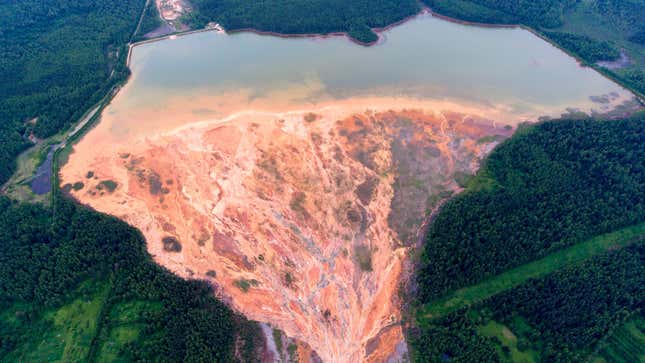
Russian Instagram blogger Sergey Zamkadniy usually posts images of beautiful sunsets or riverine adventures. His latest work, however, shows a disaster unfolding in real-time. An abandoned mine in Russia’s Ural Mountains has tainted streams orange.
Zamkadniy captured images of the disaster last week. Now, AFP reports that Russian authorities are launching an investigation into the latest in a strong of environmental catastrophes to befall the nation.
The waste is from the Levikhinsky mine, an abandoned copper mine near the village of Lyovikha in the western part of Siberia. The waste was supposed to be stored inside ponds to be treated, but it appears that recent heavy rains in the region have caused them to overflow. These rains also caused a dam to collapse and destroyed a number of buildings. According to AFP, local environmentalist Andrei Volegov alerted Russia authorities last year about the risk of overflow at the mine. They responded by saying the company responsible for the waste didn’t have the money to treat the waste, and now a disaster is unfolding.
The waters pouring through the region look eerily similar to the 2015 Gold King mine spill near Silverton, Colorado, which leached heavy metals like lead and copper. That was entirely caused by human error rather than the current disaster driven by both lax environmental protection and heavy rain. But regardless, these types of spills are are dangerous to wildlife and whatever depends on the waterways contaminated (including people). In the case of the Gold King disaster, people lost access to drinking water and irrigation. Residents from the region filed a suit against the federal government seeking $318 million for damages.
It’s possible similar issues may arise from this disaster in Lyovikha. The village has already dealt with the hardship of the mine closing decades ago. Since then, the village is best known as a place of strange and macabre mysteries, including the discovery of 248 mummified fetuses and more than a dozen dead women in two separate incidents.

Siberia as a whole is dealing with major environmental catastrophes beyond this disaster. Climate change has driven a record-breaking heat wave (and wildfires) this year. Beyond the heat, another mining company is behind not one but two other catastrophes this year. Nornickel released industrial wastewater from one of its processing plants into nearby waterways. This came not even a month after melting permafrost caused a diesel tank at another of its facilities to collapse and spill 20,000 tons of diesel, turning a river red.
Russia is having a rough time. The country sits in the Arctic, which is already facing environmental pressure from global warming heating everything up. However, the country is failing to hold companies accountable and take action to protect its natural resources.